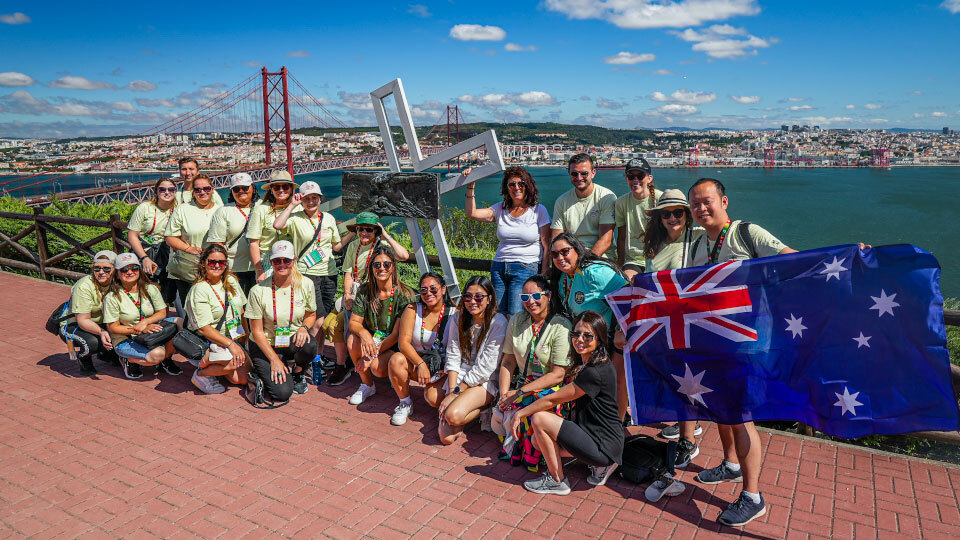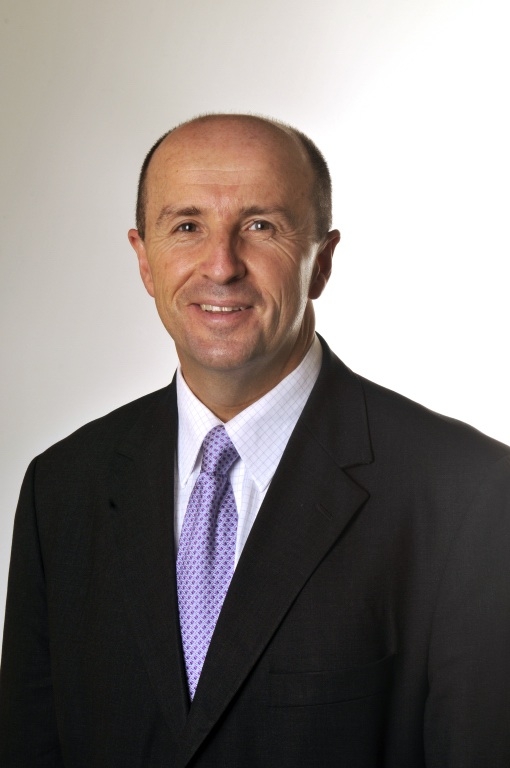



Who will you find at World Youth Day?
Dr. Anthony Cleary
Friday, August 4, 2023

Australian pilgrims to World Youth Day. Photo by Anthony Costa, provided by the author.
This week, hundreds of thousands of young people are gathering in Lisbon, Portugal for World Youth Day. 3,000 young Australians are among them, along with 5,000 Canadians and 28,600 Americans.
WYD has become the largest regular gathering of young people in the world, and a pillar of the new evangelisation. It aims to rejuvenate the faith life of young people, especially those who are nominal in their religious practices or who have abandoned their beliefs altogether.
It achieves this, and a whole lot more.
I am passionate about World Youth Day. In 2018, I completed a PhD on why people were drawn to it and what were their expectations, and secondly, how they experienced the event and what they perceived were its most beneficial aspects. This research with pilgrims who travelled to Madrid in 2011 and Rio in 2013 was fascinating, and shattered some of my own false assumptions.
First and foremost, it was clear that WYD pilgrims are drawn from across the religious and spiritual spectrum. Contrary to what some might expect, they do not represent a “religious elite,” but are highly diverse. The same is true of those who are gathering in Lisbon.
In recent weeks I surveyed and met with some of the 1,000 pilgrims travelling from Sydney, Australia. As was with my previous research, I found that many pilgrims tend not to participate in organised religion, or express their existential needs and questions in religious terms. They describe themselves as “spiritual” but not religious, and are comfortable with expressing a secular, individualistic, eclectic, subjective, and self-reliant worldview.
Through my ongoing research, I discovered a clear set of categories among WYD pilgrims. There are most likely other sub-groups as well, but these groupings paint a picture of who you might find in Lisbon this week.
Devoted Pilgrims have a highly developed religiosity, characterized by a strong commitment to and high priority on their Catholic faith. Many have attended World Youth Day multiple times. They are actively involved in Church life, especially through regular worship, and many are associated with ecclesial groups and movements. They value the place of personal prayer in their daily lives, are inspired by the words of the Pope and the Magisterium, and feel comfortable expressing their Catholic faith with others.
Emma has been to three World Youth Days. She reflected,
 Anthony Cleary is the Director of Mission & Identity for Sydney Catholic Schools, Archdiocese of Sydney, Australia. Anthony holds a Bachelor of Education, Master of Religious Education, Master of Educational Leadership, Master of Arts (Theological Studies) . In 2018 he completed a PhD that examined the appeal and impact of World Youth Day. Anthony has attended five World Youth Days, often leading large contingents of teachers and school-aged pilgrims.
Anthony Cleary is the Director of Mission & Identity for Sydney Catholic Schools, Archdiocese of Sydney, Australia. Anthony holds a Bachelor of Education, Master of Religious Education, Master of Educational Leadership, Master of Arts (Theological Studies) . In 2018 he completed a PhD that examined the appeal and impact of World Youth Day. Anthony has attended five World Youth Days, often leading large contingents of teachers and school-aged pilgrims.
My faith is the most important thing in my life, it’s at the heart of my identity … there would not be too many things in my life that it doesn’t influence … When you go to WYD, you see your faith is so much bigger than what you imagined … there’s a smorgasbord of different things, different ways you can participate in the church, … and then there is the Holy Father and his words of encouragement.Religious Believers value the importance of religion and recognize that involvement in Church life should characterize the living out of one’s faith. Religious Believers strongly identify with the Catholic Church, and many have attended World Youth Day previously. In contrast with Devoted Pilgrims, however, Religious Believers are not as regular in Mass attendance and commitment to parish activities. They value different aspects of the pilgrimage experience offered by World Youth Day. This includes the opportunity to bond with fellow pilgrims, the importance of sacrifices and hardships, and the quest for and experience of sacred things. David’s loose affiliation is common to many of the religious believers:
In my family everyone’s Catholic and I think that we are very religious. But as we grew up, we kind of stopped going to Church each week … I have not changed my beliefs though, and when I got offered to go [to World Youth Day] I thought this could be good to go back to Church and restore my faith, and I was very happy to get into it again.Meaning Seekers are somewhat involved in the practice of their faith, both through communal worship and personal prayer, but less regularly than Devoted Pilgrims and Religious Believers. They tend to think that religion is reasonably important, and consider it to be a source of personal meaning and influence on their daily living. As the name suggests, many Meaning Seekers describe their faith as “searching,” and they’ll participate in World Youth Day in the hope of satisfying a diverse range of personal goals. For them the appeal of World Youth Day is strongly associated with the social and emotional dynamics of the event. Joanne finds that World Youth Day helps her in searching:
Religion is fairly important. It helps me to have a deeper understanding of my own personal identity … finding meaning and purpose in my life … I am actually a veteran of World Youth Day. I think that the reason why I come back is because each time I’ve had a different experience, and I come to know more about myself and my relationship with God … each World Youth Day is just like a retreat.Social Tourists attribute little value to the importance of religion and consider themselves to be disengaged from its beliefs and practices. They are rarely involved in Church life, and give little importance to the place of personal prayer in their daily lives. Going in, they intend their attendance at World Youth Day to be a one-off. Most are going because they have friends who were attending. Some have heard about the event vicariously, and are attracted to the idea of travel, participating in a mega-event, and making new friends. Like many Social Tourists, Michael saw his travel from the perspective of leisure, enjoyment, and the achievement of personal milestones:
To be honest, religion isn’t the most important part of my life … In my life I doubt a lot, I doubt there is a God and I doubt my faith. But to be honest, I kind of liked the adventure aspect … and I like hanging out with my friends halfway around the world and doing some fun stuff.World Youth Day was established in part as a response to the social, cultural and religious realities of postmodernity. Its evangelical intent was informed by the “new evangelisation”. Through it, the Catholic Church hoped to address the individualization of beliefs and practices, and the “faith fatigue” that had come to characterise many western nations. It was hoped that through their experience of international gathering, young people would be rejuvenated in spirit and become more actively engaged in the life, work and mission of the Church. My decade-long research has found that World Youth Day makes a difference in people’s lives, including those who have little or no commitment to a faith community. Pilgrims find the heightened levels of emotional energy satisfying, and attest to an elevated sense of self-esteem and solidarity with others. They are animated when describing their experiences, especially the ‘buzz’ and ‘vibe’ of the World Youth Day atmosphere, and their favourite moments. World Youth Day is perceived to be enjoyable, rewarding, and fulfilling. This is why all sorts of people find appeal in the international gathering, believing that it may awaken in them a sense of value, purpose and meaning.
 Anthony Cleary is the Director of Mission & Identity for Sydney Catholic Schools, Archdiocese of Sydney, Australia. Anthony holds a Bachelor of Education, Master of Religious Education, Master of Educational Leadership, Master of Arts (Theological Studies) . In 2018 he completed a PhD that examined the appeal and impact of World Youth Day. Anthony has attended five World Youth Days, often leading large contingents of teachers and school-aged pilgrims.
Anthony Cleary is the Director of Mission & Identity for Sydney Catholic Schools, Archdiocese of Sydney, Australia. Anthony holds a Bachelor of Education, Master of Religious Education, Master of Educational Leadership, Master of Arts (Theological Studies) . In 2018 he completed a PhD that examined the appeal and impact of World Youth Day. Anthony has attended five World Youth Days, often leading large contingents of teachers and school-aged pilgrims. Related Articles:
<<
SUPPORT LABEL
$50
$100
$150
$250
OTHER AMOUNT
DONATE
Receive our newsletters
Stay Connected
Receive our newsletters

Stay Connected







